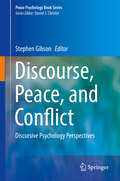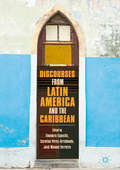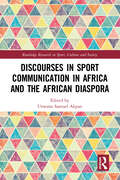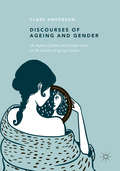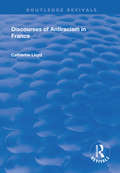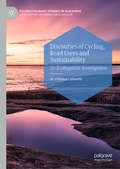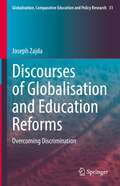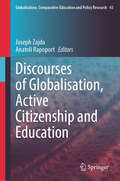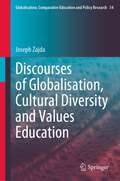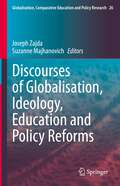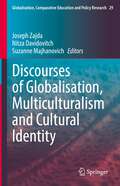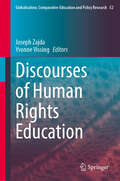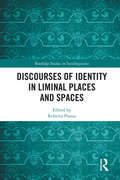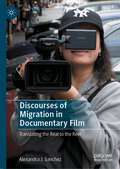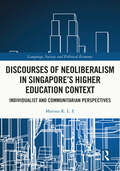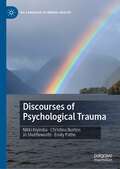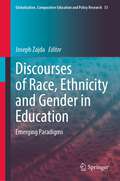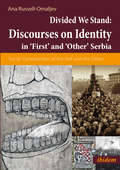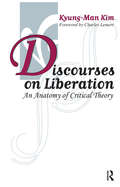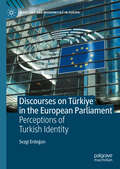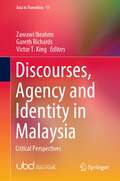- Table View
- List View
Discourse, Gender and Shifting Identities in Japan: The Longitudinal Study of Kobe Women’s Ethnographic Interviews 1989-2019, Phase One (Routledge Studies in Sociolinguistics)
by Claire Maree Kaori OkanoThis book is the first in a unique series drawn from an interdisciplinary, longitudinal project entitled ‘Thirty Years of Talk.’ For 30 years, Okano recorded ethnographic interviews and collected data on the language of working class women in Kobe, Japan. This long-range study sketches the transitions in these women's lives and how their language use, discourse and identities change in specific sociocultural contexts as they shift through different stages of their personal and public lives. It is a ground-breaking, ‘real time’ panel study that follows the same individuals and observes the same phenomena at regular intervals over three decades. In this volume the authors examine the changes in the speech of one particular woman, Kanako, as her social identity shifts from high-school girl to mother and fisherman’s wife, and as her relationship with the interviewer develops. They identify changes in linguistic strategies as she negotiates gender/sexuality norms, stylistic features related to the construction of rapport, the use of discourse markers as she gets older, and the interviewer’s information-seeking strategies.
Discourse, Peace, and Conflict: Discursive Psychology Perspectives (Peace Psychology Book Series)
by Stephen GibsonThis first-of-its-kind volume brings discursive psychology and peace psychology together in a compelling practical synthesis. An array of internationally-recognised contributors examine multiple dimensions of discourse—official and casual, speech, rhetoric, and text—in creating and maintaining conflict and building mediation and reconciliation. Examples of strategies for dealing with longstanding conflicts (the Middle East), significant flashpoints (the Charlie Hebdo case), and current heated disputes (the refugee ‘crisis’ in Europe) demonstrate discursive methods in context as they bridge theory with real life. This diversity of subject matter is matched by the range of discursive approaches applied to peace psychology concepts, methods, and practice.Among the topics covered: Discursive approaches to violence against women.The American gun control debate: a discursive analysis.Constructing peace and violence in the Palestinian-Israeli conflict.Discursive psychological research on refugees. Citizenship, social injustice, and the quest for a critical social psychology of peace.The emotional and political power of images of suffering: discursive psychology and the study of visual rhetoric. Discourse, Peace, and Conflict offers expansive ideas to scholars and practitioners in peace psychology, as well as those in related areas such as social psychology, political psychology, and community psychology with an interest in issues pertaining to peace and conflict.
Discourses from Latin America and the Caribbean: Current Concepts And Challenges
by Eleonora Esposito Carolina Pérez-Arredondo José Manuel FerreiroThis edited collection brings together the latest research on discourse and society in Latin America and Caribbean in one volume. Employing cross-cutting approaches to current political, institutional and media discourses, it bridges existing theoretical and analytical gaps between the socio-political macro issues and the micro aspects of linguistic analysis to provide fresh insights that deconstruct the complex socio-political power dynamics in Latin America and the Caribbean. Across eight chapters this volume explores the regions’ thorny relationship with their complex histories of colonialism and slavery as well as the ongoing, multifaceted constructions of hegemonic and counter-hegemonic identities at the individual, regional and national levels. In doing so, it demonstrates the unique and rich particularities of these regions and why it is that they challenge many conventional dogmas and methods across the Social Sciences. This book will be of particular interest to scholars working in Discourse Studies, Sociology, Politics, Anthropology and Latin American and Caribbean Studies.
Discourses in Sport Communication in Africa and the African Diaspora (Routledge Research in Sport, Culture and Society)
by Unwana Samuel AkpanThis book explores sport communication in Africa and the African diaspora. Drawing on multidisciplinary perspectives, it deepens our understanding of the importance of sport in African society as well as the profound and growing influence of the African diaspora in world sport, as athletes, scholars, leaders, and business and media professionals. Including contributions from leading African researchers and experts on sport in Africa across the fields of sociology, history, business, communication studies, media studies, and education, this book examines sport communication across a wide variety of contexts and countries, from the role of radio in developing awareness of the Olympic Games in Nigeria to the impact of Colin Kaepernick’s protest on journalistic practices in Historically Black Colleges and Universities in the USA. Presenting fascinating case studies such as print media and the historiography of football in Cameroon, racism in European football, and the relationship between sport, communication policy-making, and sustainable development in Africa, this book shines new light on key themes in the study of sport communication. This is fascinating reading for anybody with an interest in social-cultural issues in sport, the business and management of sport, sport and the media, African studies, or development studies.
Discourses of Ageing and Gender: The Impact of Public and Private Voices on the Identity of Ageing Women
by Clare AndersonThis book presents in-depth investigation of the language used about women and ageing in public discourse, and compares this with the language used by women to express their personal, lived experience of ageing. It takes a linguistic approach to identify how messages contained in public discourse influence how individual women evaluate their own ageing, and particularly their ageing appearance. It begins by establishing the wider cultural context that produces prevailing attitudes to women, before turning to an analysis of representations of the ageing female body in beauty and cosmetic advertising and the lifestyle media. The focus then moves to a detailed investigation of women’s own perceptions of the process of ageing and of their ageing appearance as revealed through their personal narratives. The final chapters challenge dominant attitudes to women and ageing by presenting two case studies of women who for different reasons and in different ways refuse to conform to cultural expectations. This work provides a platform for further academic research in the fields of linguistics, gerontology, gender and media studies; as well as offering meaningful applications in the wider domains of business and advertising.
Discourses of Antiracism in France (Routledge Revivals)
by Catherine LloydFirst published in 1998, this book is an examination of antiracist discourses and practices in France. It sets out to trace the development of post-war French antiracism through the life of antiracist organizations, setting this within a broader historical, political and social context. It breaks new ground in that it analyses antiracism as a body of ideas in its own right, rather than as a mirror image of racism. The author uses previously unpublished archival material from French organizations combined with observations from current events. She argues that antiracist discourses and practices are structured around four main themes: discrimination, representation, solidarity and hegemony. While perceptions of discrimination have evolved into complex understandings of social exclusion, the representational functions of antiracist groups were challenged by immigrant workers movements themselves. Solidarity remained central to antiracist practices in different political contexts. Underpinning these features lies a hegemonic social project through which antiracists have sought to promote a 'common sense' through political and educational campaigns. The author concludes that French antiracism although constantly changing and refocusing is now a pluralist, transversal, hegemonic movement and an important component of civil society.
Discourses of Cycling, Road Users and Sustainability: An Ecolinguistic Investigation (Postdisciplinary Studies in Discourse)
by M. Cristina CaimottoThis book employs a Critical Discourse Studies (CDS) framework to examine cycling mobility, marking a new turn in ecolinguistic discourse analysis. The author focuses specifically on environment-related arguments concerning the promotion of higher levels of cycling, mainly as a means of transport, and investigates the “US vs. “THEM” narratives present in many discourses about road users. Analysing newspaper articles, institutional documents and spoken interviews, the author searches for a positive new discourse that would inspire and encourage cycling as a habitual means of transport, rather than simply exposing ecologically destructive discourse. The book will be of interest to discourse and ecolingusitics scholars, as well as contributing to the lively debate about how to increase cycling in fields such as sustainability, sociology, transport planning and management.
Discourses of Deficit
by Jonathan Crichton Christopher N. CandlinKey practitioners and researchers explore how people routinely and at particular sites are discursively constructed as deficient in ways that may affect their life chances. The book offers examples of how adopting multiple perspectives on research can provide a rich explanatory analysis of the construct of 'deficit' in a range of domains.
Discourses of Globalisation and Education Reforms: Overcoming Discrimination (Globalisation, Comparative Education and Policy Research #31)
by Joseph ZajdaThis book focuses on discourses of effective learning environments globally for reducing discrimination in schools. It offers innovative ideas concerning the future directions that education and policy reforms could take, in order to promote equality, social justice, and access to quality of education for all.The chapters offer a timely analysis of current issues affecting schooling and strategies for creating effective learning environments globally for overcoming discriminations in schools. It is argued that that one of the most significant variables in creating effective learning environments for reducing classroom discrimination is the student’s cultural identity, the self-concept and self-esteem. The next variables influencing students’ learning environment are motivational strategies, self-regulated learning, and students’ active engagement in constructivist learning. This book contributes in a very scholarly way, to a more holistic understanding of the nexus between globalisation, comparative education research and education reforms for reducing discrimination. It will be beneficial for a broad spectrum of users, including policy-makers, academics, graduate students, education policy researchers, administrators, and practitioners.
Discourses of Globalisation, Active Citizenship and Education (Globalisation, Comparative Education and Policy Research #43)
by Joseph Zajda Anatoli RapoportThis book analyses dominant discourses of globalisation, and citizenship in schools. Diverse worldviews and ideologies construct different meanings for globalization, citizenship, and education, resulting in conceptual debates, tensions, competing discourses, and practical challenges for scholars and educators, navigating complex and contested terrain. The chapters in this volume advance further the discussions on the phenomenon of globalisation, and how it impacts on the nature of active citizenship education in schools around the world. In order to help students recognize that they are inherently global citizens, capable of understanding that local actions are globally interdependent, and that communities can be seen as temporal social networks within and beyond physical space, and action for global citizenship in school. The book, by building on intercultural dialogue and active citizenship education in schools, will promote critical appraisal of various views of the world, andoffers different ways to reconstruct and re-imagine social reality.
Discourses of Globalisation, Cultural Diversity and Values Education (Globalisation, Comparative Education and Policy Research #34)
by Joseph ZajdaThis book examines dominant discourses in values education globally. It critiques dominant discourses and debates pertaining to values education and cultural identity, set against the current backdrop of growing social stratification and unequal access to quality education. It addresses discourses concerning globalisation, ideologies and the state, as well as approaches to values education in schools. The book explores the ambivalent and problematic connections between the state, globalisation and values education. It also explores conceptual frameworks and methodological approaches applicable to research on values education, multiculturalism and identity politics. Drawing on diverse paradigms, ranging from critical theory to globalisation, the book focuses on globalisation, ideology and values education and critically examines recent research dealing with cultural diversity and its impact of identity politics. Given the need for a multiple perspective approach, authors from diverse backgrounds offer a wealth of insights, contributing to a more holistic understanding of the nexus between values education, multiculturalism and national identity. With contributions from key scholars worldwide, the book should be required reading for a broad spectrum of users, including policy-makers, academics, graduate students, education policy researchers, administrators and practitioners.
Discourses of Globalisation, Human Rights and Sports (Globalisation, Comparative Education and Policy Research #38)
by Joseph Zajda Yvonne VissingThis book discusses major discourses of performing sports within human rights. Research findings data demonstrate that sports is an inequitable field today that has the potential to be a social change agent. There is more discussion about rights violations and what the fields of sports can do to be more rights-respecting, but the discussions are at a surface, rather than analytic level for most sports organizations. In sports, culture and human rights, as an emerging field, it is important to develop well crafter theoretical, methodological, and pedagogical body of knowledge. There is an academic discipline of sport that showcases its interdisciplinary nature. Linking sport to the field of human rights will require theoretical, methodological, and pedagogical evolution in this new discipline. There are both organizational, environmental and individual factors associated within the nexus of sports, athletes and human rights.This book links together sports and human rights in a systematic and analytical way. It contains chapters that discuss human rights policies in performing sports, from both organizational and interpersonal perspectives. The book focuses on the benefits of sports and the human rights and safety challenges within the operations of sports organizations and their impact on individual players.
Discourses of Globalisation, Ideology, Education and Policy Reforms (Globalisation, Comparative Education and Policy Research #26)
by Joseph Zajda Suzanne MajhanovichThis book presents a global overview of discourses of globalization, current research in education and education policy reforms. It first examines globalisation, education and policy research and reforms in education, including coverage of main trends in education and policy reforms globally, as well as specific policy issues such as equity, inclusive schooling and quality education for all. Next, it offers a comparative perspective in evaluating the ambivalent and problematic relationship between globalisation, ideology, the state and education reforms globally. One significant impact of globalization on education policy and reforms is the competitive comparison of education systems. These comparisons are usually based on common achievement tests such as TIMSS, PIRLS and PISA. Major policy reforms are frequently justified with reference to these achievement data. The book features coverage of education reforms globally, and academic achievement syndrome. Not only do the chapters offer a timely analysis of current issues shaping education policy research, but the book also contains ideas concerning the future directions that education and policy reforms could take, to offer more democratic and equitable education. Respective chapters critically assess the dominant discourses and debates on education and policy reforms. By doing so, it provides a comprehensive view of the diverse and intersecting discourses on globalisation and policy-driven reforms in education.
Discourses of Globalisation, Multiculturalism and Cultural Identity (Globalisation, Comparative Education and Policy Research #29)
by Joseph Zajda Suzanne Majhanovich Nitza DavidovitchThis book examines dominant discourses in multiculturalism and cultural identity globally. It critiques dominant discourses and debates pertaining to multiculturalism and cultural identity, set against the current backdrop of growing social stratification and unequal access to quality education. It addresses current discourses concerning globalisation, ideologies and the state, as well as approaches to constructing national, ethnic and religious identities in the global culture. It explores the ambivalent and problematic connections between the state, globalisation, and the construction of cultural identity. The book also explores conceptual frameworks and methodological approaches applicable to research on the state, globalisation, multiculturalism and identity politics. Drawing on diverse paradigms, ranging from critical theory to globalisation, the book, by focusing on globalisation, ideology and cultural identity, critically examines recent research dealing with cultural diversity and its impact of identity politics. Given the need for a multiple perspective approach, the authors, who have diverse backgrounds and hail from different countries and regions, offer a wealth of insights, contributing to a more holistic understanding of the nexus between multiculturalism and national identity. With contributions from key scholars worldwide, the book should be required reading for a broad spectrum of users, including policy-makers, academics, graduate students, education policy researchers, administrators, and practitioners.
Discourses of Globalisation, and the Politics of History School Textbooks (Globalisation, Comparative Education and Policy Research #32)
by Joseph ZajdaThis book focuses on discourses of the politics of history education and history textbooks. It offers a new insight into understanding of the nexus between ideology, the state, and nation-building, as depicted in history education and school textbooks. It especially focuses on the interpretation of social and political change, significant events, looking for possible biases and omissions, leadership and the contribution of key individuals, and continuities. The book discusses various aspects of historical narratives, and some selected key events in defining identity and nation-building. It considers the role of historiography in dominant historical narratives. It analyses history education, in both local and global settings, and its significance in promoting values education and intercultural and global understanding. It is argued that historical narratives add pedagogies, grounded in constructivist, metacognitive and transformational paradigms, have the power to engage the learner in significant and meaningful learning experiences, informed by multiple discourses of our historical narratives and those of other nations.
Discourses of Human Rights Education (Globalisation, Comparative Education and Policy Research #52)
by Joseph Zajda Yvonne VissingThis book examines critically major issues confronting human rights implementation in schools, both locally and globally. It analyzes the challenges that different societies are confronted with, as they attempt to implement, protect and defend democracy, cultural diversity and human rights in schools. The book also documents human rights challenges that result from the increased cultural diversity that occurs in a more mobile and globalized world. By examining education policy shifts in the use of the major discourses in human rights and education, the book offers a comprehensive synthesis of the intersecting and diverse discourses of globalisation, cultural diversity, human rights, and education. It also provides innovative ideas concerning the future directions for authentic models of globalisation, human rights and education.
Discourses of Identity in Liminal Places and Spaces (Routledge Studies in Sociolinguistics)
by Roberta PiazzaThis collection highlights the interplay between language and liminal places and spaces in building distinct narratives of selfhood. The book uses an interdisciplinary approach to examine linguistic and social phenomena in places shaped by displacement and social inequality. The book also looks at chronotopes, the Bakhtinian-inspired concept of the interconnectedness of time and space in identity. The volume demonstrates how studying liminal places and spaces can offer unique insights into how people construct language and selfhood in these spaces, making this key reading for researchers in sociolinguistics, discourse analysis, geography, and linguistic anthropology.
Discourses of Migration in Documentary Film: Translating the Real to the Reel
by Alexandra J. SanchezThis book proposes a new approach to the study of discourse in documentary film. It considers discourse as a basic factor of translation (as well as contexts, agents, and practices) and draws on the parallels between the disciplines of translating and documentary making to perform a discourse analysis of documentaries centering on migration. By relying on the concept of translation as a heuristic tool, the author highlights the discursive mechanisms of 18 documentaries on Latin American migration shown in the United States by the Public Broadcasting Service series POV between 1996 and 2018. This interdisciplinary approach facilitates a holistic analysis of documentary film discourse, while also raising awareness of positive discourses of migration. The book will be of interest to students and scholars involved in the study of discourse, translation, documentary, television, and migration.
Discourses of Neoliberalism in Singapore's Higher Education Context: Individualist and Communitarian Perspectives (Language, Society and Political Economy)
by Marissa Kwan Lin EE explores, using textual (words) and visual (image) data from the corporate newsletters of two prominent Asian universities, how particular discourses and their associated discursive representations of neoliberal logic and subjectivity occur in higher education. In particular, she looks at the expression of both institutional priorities and state imperatives that lend themselves to a complementarity built upon two contradictory perspectives: individualism and communitarianism. She argues that the ever-increasing demand for, and utility of higher education in neoliberal society means that it no longer functions merely to provide knowledge and skills, but has implications for society, the individual and the state with regard to their ways of thinking, doing and being. Contributing to a growing corpus of literature on how higher education around the world is being shaped by neoliberal policies, E’s research is based on work done in the city-state of Singapore, a less-well represented context in current literature. While both higher education institutions possess significantly different institutional identities and backgrounds, the alignment of their varied representations of neoliberal logic and subjectivity with state-sanctioned imperatives that indirectly impose demands and constraints shows how neoliberalism as ideology adapts to the socio-political, socio-cultural and socio-economic dimensions that make up the Singapore context. The discursive representations of context-dependent neoliberal logics and subjectivity are discussed in terms of their ideological implications, focusing primarily on the complementarity between seemingly contradictory ideological positions. E’s work uses an innovative framework that integrates aspects of Discourse Theory with Critical Discourse Analysis and demonstrates the use of this framework through empirical linguistic and image analysis. Appealing to academics and graduate students in linguistics, especially those with an interest in critical multimodal discourse analysis, audiences from the domains of higher education research, critical geography, sociology and political science will also find this a useful book.
Discourses of Psychological Trauma (The Language of Mental Health)
by Nikki Kiyimba Christina Buxton Jo Shuttleworth Emily PatheThis book offers a critical perspective of the dominant discourses within the field of psychological trauma. It provides a challenge to normative western constructs and unsettles assumptions about accepted notions of universality and the nature of trauma. Traditionally the concept of psychological trauma has been widely accepted within mental health professions. However, in a post-positivist era, the language of mental health is shifting and making room for alternative discourses that include wider contextual influences, such as the impact of sociological, cultural, and technological developments. These wider discourses are illuminated as the authors draw together some of these arguments into one accessible text. Rather than claim definitive answers to the issues raised, readers are invited to engage with the discussions presented in order to position themselves in relation to the range of trauma discourses available.
Discourses of Race, Ethnicity and Gender in Education: Emerging Paradigms (Globalisation, Comparative Education and Policy Research #33)
by Joseph ZajdaThis book examines dominant discourses affecting race, ethnicity and gender in education and societies globally. It presents cutting-edge research on the major global trends in globalization, race, ethnicity and gender education globally. Using diverse paradigms, ranging from critical theory to discourse analysis, the book examines major trends in race, ethnicity and gender research, with a focus on the ambivalent and problematic relationship between race, ethnicity and gender discourses, ideology and the state. It discusses and critiques key issues in race, ethnicity and gender research. Readers will gain a more holistic understanding of the nexus between race, ethnicity and gender discourses and dominant ideologies, both locally and globally. It also provides an easily accessible, practical, yet scholarly insights into local and global trends in the field of race, ethnicity and gender education. With contributions from key scholars worldwide, this book will be useful to a broad spectrum of readers, including policy-makers, academics, graduate students, education policy researchers, administrators and practitioners.
Discourses on Identity in 'First' and 'Other' Serbia: Social Construction of the Self and the Other in a Divided Serbia
by Ana OmaljevSerbia is still widely thought of as an unfinished state, whose people struggle to establish a compelling identity narrative in answer to the question 'who are we?'. While existing literature has over-analyzed Serbian nationalism, the Serbian public sphere remains largely ignored. This engaging and timely book fills this gap by giving context to the persistent and overwhelming dialogue between opposing factions on the identity spectrum in Serbia. Omaljev's focus on elite discourses provides a fresh perspective on this contentious subject. It offers an original understanding of the competing arguments surrounding 'First' and 'Other' Serbia and of the contested visions of Serbian national identity and broader European identity.By closely examining the identity vocabulary of Serbian elites and the opposing ways in which these elites view the use of labels such as 'anti-Serbian', 'patriot', and 'traitor', this book provides a vital lesson in post-conflict nation-building and raises important questions about the symbolic representations of political and cultural identities. A much-needed and compelling intervention in the Serbian identity discourse, Omaljev's work is a must-read for any researcher on the Western Balkans.
Discourses on Liberation: An Anatomy of Critical Theory
by Kyung-Man Kim"Kyung-Man Kim offers a comprehensive inventory of the obstacles the most powerful and influential thinkers of our time tried to overcome, the questions they asked without finding good answers, and the questions they've overlooked or avoided. No one concerned with the ethical impact of knowledge and the role it may play in winning the case of human freedom can neglect Kyung-Man Kim's analysis." -Zygmut Bauman "This is a powerful book, compelling for every reader who wants to know how current sociological theory can be used to change, not just interpret, the social world. Kyung-man Kim offers masterful readings of the main theoretical formations of the last century." -Norman K. Denzin, University of Illinois "A lucid exposition and critique of Bourdieu, Giddens, and Habermas, and of the phenomenological ethnographies of Garfinkel and the ethnomethodologists who provided their starting point. Kim, who has honed his skills in his acute contributions to the hyper-reflexive sociology of scientific knowledge, now successfully takes on the big game of the emancipatory theory world. -Randall Collins, University of Pennsylvania What binds the theoretical work of Pierre Bourdieu, Anthony Giddens, and Jurgen Habermas? Although these and other contemporary theorists offered major critiques of society, they stopped short of plausible proposals to achieve the liberation of individuals and societies. Kyung-Man Kim offers a new reading of contemporary critical theorists and explains how, by reading them together, we may find a practical basis for progressive social change.
Discourses on Türkiye in the European Parliament: Perceptions of Turkish Identity (Identities and Modernities in Europe)
by Sezgi ErdoğanThis book analyses how Türkiye and Europe were discursively constructed through the representations of Türkiye in the European Parliament (EP) between 2007 and 2015. By providing an in-depth analysis of the discursive representations of Türkiye in the EP, the book discusses the European perception of Turkish identity and, in turn, reveals the different visions of Europe that these EP discourses relationally construct in Türkiye’s de-Europeanization process, compared to its Europeanization process in the 1997-2007 term. This book will be of interest to scholars and students of Political Sociology, International Relations, Discourse Analysis, European Studies, Turkish Studies, and Identity Studies.
Discourses, Agency and Identity in Malaysia: Critical Perspectives (Asia in Transition #13)
by Victor T. King Zawawi Ibrahim Gareth RichardsThis book seeks to break new ground, both empirically and conceptually, in examining discourses of identity formation and the agency of critical social practices in Malaysia. Taking an inclusive cultural studies perspective, it questions the ideological narrative of ‘race’ and ‘ethnicity’ that dominates explanations of conflicts and cleavages in the Malaysian context. The contributions are organised in three broad themes. ‘Identities in Contestation: Borders, Complexities and Hybridities’ takes a range of empirical studies—literary translation, religion, gender, ethnicity, indigeneity and sexual orientation—to break down preconceived notions of fixed identities. This then opens up an examination of ‘Identities and Movements: Agency and Alternative Discourses’, in which contributors deal with counter-hegemonic social movements—of anti-racism, young people, environmentalism and independent publishing—that explicitly seek to open up greater critical, democratic space within the Malaysian polity. The third section, ‘Identities and Narratives: Culture and the Media’, then provides a close textual reading of some exemplars of new cultural and media practices found in oral testimonies, popular music, film, radio programming and storytelling who have consciously created bodies of work that question the dominant national narrative. This book is a valuable interdisciplinary work for advanced students and researchers interested in representations of identity and nationhood in Malaysia, and for those with wider interests in the fields of critical cultural studies and discourse analysis.“Here is a fresh, startling book to aid the task of unbinding the straitjackets of ‘Malay’, ‘Chinese’ and ‘Indian’, with which colonialism bound Malaysia’s plural inheritance, and on which the postcolonial state continues to rely. In it, a panoply of unlikely identities—Bajau liminality, Kelabit philosophy, Islamic feminism, refugee hybridity and more—finds expression and offers hope for liberation”. Rachel Leow, University of Cambridge“This book shakes the foundations of race thinking in Malaysian studies by expanding the range of cases, perspectives and outcomes of identity. It offers students of Malaysia an examination of identity and agency that is expansive, critical and engaging, and its interdisciplinary depth brings Malaysian studies into conversation with scholarship across the world”.Sumit Mandal, University of Nottingham Malaysia“This is a much-needed work that helps us to take apart the colonial inherited categories of race which informed the notion of the plural society, the idea of plurality without multiculturalism. It complicates the picture of identity by bringing in religion, gender, indigeneity and sexual orientation, and helps us to imagine what a truly multiculturalist Malaysia might look like”.Syed Farid Alatas, National University of Singapore

